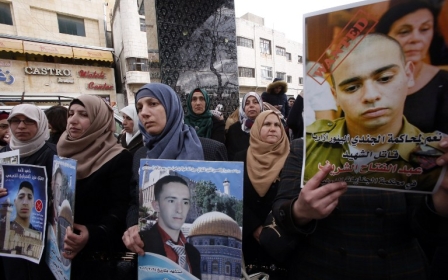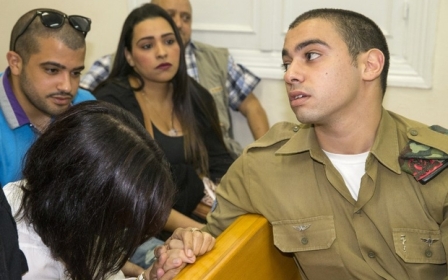Palestinians: Israeli soldier's sentence for killing is 'green light' for crimes

The sentencing of an Israeli soldier to 18 months for killing a wounded Palestinian assailant is a "green light" for the military's "crimes", a Palestinian government spokesman said Tuesday.
"The Palestinian government views this light ruling against the murderer soldier as a green light to the occupation army to continue its crimes," spokesman Tarek Rishmawi told AFP shortly after an Israeli military court sentenced Elor Azaria, 21, for the killing of Abdul Fatah al-Sharif in the occupied West Bank in March 2016.
The family of Sharif also reacted angrily to the sentencing of Azaria to18 months in prison, labelling the trial a "farce".
"A year and a half is a farce," Sharif's father Yusri told AFP. "It is only a mock trial to silence people and the families."
"The court decision is despicable," added Yusri. "If a Palestinian merely threw a rock at a soldier, he'd be handed down a three-year prison sentence at least."
Sharif was shot dead while lying on the ground, several minutes after he and another Palestinian had allegedly stabbed a soldier in the city of Hebron.
'The court decision is despicable. If a Palestinian throws a rock at a soldier, he’s given a three-year prison sentence'
- Yusri Sharif, father
"Israel considers itself a democratic country that calls for justice, but where is the justice in this decision," said Yousri.
Also commenting on the court decision, Sharif's uncle Hani reflected a sence of apathy among family members and more broadly among the Palestinian people.
"We didn’t expect a fair decision and had no real hope in a fair trial," said Hani.
"At the end of the day, the Israeli courts and the government are all part of the same establishment."
For PLO executive committee member Mustafa Barghouti, "the decision reflects that Israel is an apartheid and racist state."
"Is this how much they [Israel] value the life of a Palestinian who was shot dead while lying on the ground unconscious and injured?" Barghouthi asked rehtorically.
"The court decision just reaffirms what we believe and expected to happen," he explalined. "We do not trust the Israeli justice system nor do we trust the Israeli government."
'The court decision sends a message to [Israeli soldiers] telling them, do what you wish' - PLO committee member Mustafa Bargouthi
Barghouthi also said that the court decision sends a message of support to the Israeli soldiers who have been involved in similar incidents as Azaria.
"The court decision just sends a message to [Israeli soldiers] telling them, do what you wish," he added.
Meanwhile, Amnesty International said the sentence given to Azaria, for shooting Sharif dead in the southern West Bank was too light, while Human Rights Watch warned against proposals to pardon him.
Magdalena Mughrabi from Amnesty International said in a statement that Azaria's conviction a month ago had "offered a glimmer of hope for accountability for unlawful killings by Israeli forces".
"(But) the 18-month sentence for Elor Azaria does not reflect the gravity of the offence."
Sari Bashi, Israel and Palestine advocacy director at Human Rights Watch, called the conviction an "important message about reining in excessive use of force."
She warned, however, that pardoning him, as many ministers in Israel's right-wing government have proposed, would "encourage impunity".
Court turn around
The military prosecution originally demanded a sentence of three to five years for Azaria.
But judges said that the severity of Azaria's actions was mitigated because they took place in an active combat situation - Sharif was initially shot and injured and another Palestinian man killed during a stabbing attack at an Israeli checkpoint.
'Elor was sent to protect Israelis at the height of a wave of Palestinian terror attacks. Israel's security demands he be pardoned'
- Naftali Bennett, Jewish Home party leader
The three-judge panel however rejected the defence's two central claims that Sharif was already dead and that Azaria feared he was carrying explosives and was still a threat.
The panel said the defence could not have it "both ways", and ruled Sharif posed no threat and there was no reason to fire.
Azaria has become the focus of a right-wing campaign, led by Israeli government ministers, for his exoneration.
Reacting to the sentence, Israel's culture minister, Miri Regev, said Azaria "should not spend a day in prison... I ask the IDF chief of staff to pardon Elor".
Israel's education minister, Naftali Bennett, echoed Regev's words. "Israel's security demands he be pardoned," said Bennett, who is also the leader of the right-wing Jewish Home party.
Azaria's lawyers said at the time of the verdict that they intended to appeal against his conviction.
The trial opened last May at a military courtroom in Tel Aviv's Jaffa district but later moved inside the tightly-guarded military headquarters complex in central Tel Aviv.
Police have made arrests over online death threats against a judge and other officials and the army has assigned bodyguards to the three judges who convicted Azaria.
Another man was arrested on suspicion of inciting violence against armed forces chief of staff, Gadi Eisenkot, who ordered the prosecution of Azaria, during a rowdy protest immediately following the verdict.
Police are prepared for fresh protests following the sentencing, spokeswoman Luba Samri told AFP on Monday night.
The case has stirred controversy and rocked Israeli politics, with some on the right defending the soldier, a French-Israeli national.
The shooting came against the backdrop of a wave of Palestinian knife, gun and car-ramming attacks that erupted in October 2015.
Israel's prime minister, Benjamin Netanyahu, had said during the trial that he favours a pardon for Azaria and called his father to express his sympathy.
And a poll conducted by pro-Netanyahu newspaper Israel Hayom at the time, found that around 70 percent of Israelis favoured a pardon for Azaria.
Middle East Eye propose une couverture et une analyse indépendantes et incomparables du Moyen-Orient, de l’Afrique du Nord et d’autres régions du monde. Pour en savoir plus sur la reprise de ce contenu et les frais qui s’appliquent, veuillez remplir ce formulaire [en anglais]. Pour en savoir plus sur MEE, cliquez ici [en anglais].






